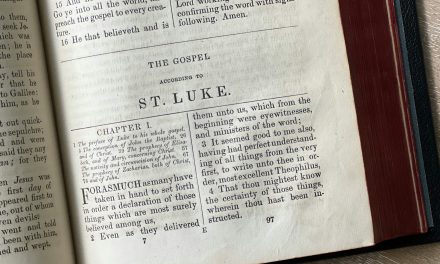In 1741 Jonathan Edwards preached his sermon, The Distinguishing Marks of a Work of the Spirit of God, from 1 John 4 for the commencement ceremony at Yale. We’ve seen four of these distinguishing marks so far: esteeming Jesus, opposing Satan, loving Scripture, and embracing truth. In this blog post, we look at the final mark and conclusion. Below are all Edwards’s words:
Loving God and Man
If the spirit that is at work among a people operates as a spirit of love to God and man, it is a sure sign that it is the Spirit of God. This sign the apostle insists upon from the 6th verse to the end of the chapter. “Beloved, let us love one another; for love is of God, and every one that loveth is born of God, and knoweth God: he that loveth not, knoweth not God; for God is love,” &c.
Here it is evident, that the apostle is still comparing those two sorts of persons that are influenced by the opposite kinds of spirits; and mentions love as a mark by which we may know who has the true spirit: but this is especially evident by the 12th and 13th verses. “If we love one another, God dwelleth in us, and his love is perfected in us: hereby know we that we dwell in him, and he in us, because he hath given us of his Spirit.”
In these verses love is spoken of as if it were that wherein the very nature of the Holy Spirit consisted; or, as if divine love dwelling in us, and the Spirit of God dwelling in us, were the same thing; as it is also in the last two verses of the foregoing chapter, and in the 16th verse. of this chapter. Therefore this last mark which the apostle gives of the true Spirit he seems to speak of as the most eminent: and so insists much more largely upon it, than upon all the rest; and speaks expressly of both love to God and men; of love to men in the 7th, 11th, and 12th verses;. and of love to God, in the 17th, 18th, and 19th verses.; and of both together, in the last two verses; and of love to men, as arising from love to God, in these last two verses.
Therefore, when the spirit that is at work amongst the people, tends this way, and brings many of them to high and exalting thoughts of the Divine Being, and his glorious perfections; and works in them an admiring, delightful sense of the excellency of Jesus Christ; representing him as the chief among ten thousand, and altogether lovely, and makes him precious to the soul; winning and drawing the heart with those motives and incitements to love, of which the apostle speaks in that passage of Scripture we are upon, viz. The wonderful, free love of God in giving his only-begotten Son to die for us, and the wonderful dying love of Christ to us, who had no love to him, but were his enemies; must needs be the Spirit of God, as ver. 9, 10.
“In this was manifested the love of God towards us, because God sent his only begotten Son into the world, that we might live through him. Herein is love; not that we loved God, but that he loved us, and sent his Son to be the propitiation for our sins.” And ver. 16. “And we have known, and believed, the love that God hath to us.” And ver. 19. “We love him because he first loved us.”
The spirit that excites to love on these motives, and makes the attributes of God as revealed in the gospel, and manifested in Christ, delightful objects of contemplation; and makes the soul to long after God and Christ—after their presence and communion, acquaintance with them, and conformity to them—and to live so as to please and honour them; the spirit that quells contentions among men, and gives a spirit of peace and good will, excites to acts of outward kindness, and earnest desires of the salvation of souls-and causes a delight in those that appear as the children God, and followers of Christ; I say, when a spirit operates after this manner among a people, there is the highest kind of evidence of the influence of a true and divine spirit.
Indeed there is a counterfeit love, that often appears among those who are led by a spirit of delusion. There is commonly in the wildest enthusiasts, a kind of union and affection, arising from self-love, occasioned by their agreeing in those things wherein they greatly differ from all others, and from which they are objects of the ridicule of all the rest of mankind. This naturally will cause them so much the more to prize those peculiarities that make them the objects of others’ contempt.
Thus the ancient Gnostics, and the wild fanatics that appeared at the beginning of the reformation, boasted of their great love one to another; one sect of them, in particular, calling themselves the family of love. But this is quite another thing, than that Christian love I have just described: it is only the working of a natural self-love, and no true benevolence, any more that the union and friendship which may be among a company of pirates, that are at war with all the rest of the world. There is enough said in this passage of the nature of a truly Christian love, thoroughly to distinguish it from all such counterfeits. It is love that arises from apprehension of the wonderful riches of the free grace and sovereignty of God’s love to us, in Christ Jesus; being attended with a sense of our own utter unworthiness, as in ourselves the enemies and haters of God and Christ, and with a renunciation of all our own excellency and righteousness. See ver. 9, 10, 11, and 19.
The surest character of true divine supernatural love—distinguishing it from counterfeits that arise from a natural self-love—is, that the Christian virtue of humility shines in it; that which above all others renounces, abases, and annihilates what we term self. Christian love, or true charity, is an humble love. 1 Cor. xiii. 4, 5. “Charity vaunteth not itself, is not puffed up, doth not behave itself unseemly, seeketh not her own, is not easily provoked.” When therefore we see love in persons attended with a sense of their own littleness, vileness, weakness, and utter insufficiency; and so with self-diffidence, self-emptiness, self-renunciation, and poverty of spirit; these are the manifest tokens of the Spirit of God.
He that thus dwells in love, dwells in God, and God in him. What the apostle speaks of as a great evidence of the true Spirit, is God’s love or Christ’s love; as ver. 12.—”his love is perfected in us.” What kind of love that is, we may see best in what appeared in Christ’s example. The love that appeared in that Lamb of God, was not only a love to friends, but to enemies, and a love attended with a meek and humble spirit. “Learn of me,” says he, “for I am meek and lowly in heart.”—Love and humility are two things the most contrary to the spirit of the devil, of any thing in the world; for the character of that evil spirit, above all things, consists in pride and malice.
Conclusion
Thus I have spoken particularly to the several marks the apostle gives us of a work of the true Spirit. There are some of these things which the devil would not do if he could: thus he would not awaken the conscience, and make men sensible of their miserable state by reason of sin, and sensible of their great need of a Saviour; and he would not confirm men in the belief that Jesus is the Son of God, and the Saviour of sinners, or raise men’s value and esteem of him: he would not beget in men’s minds an opinion of the necessity, usefulness, and truth of the Holy Scriptures, or incline them to make much use of them; nor would he show men the truth, in things that concern their souls’ interest; to undeceive them, and lead them out of darkness into light, and give them a view of things as they really are.
And there are other things that the devil neither can nor will do; he will not give men a spirit of divine love, or christian humility and poverty of spirit; nor could he if he would. He cannot give those things he has not himself: these things are as contrary as possible to his nature. And therefore when there is an extraordinary influence or operation appearing on the minds of a people, if these things are found in it, we are safe in determining that it is the work of God, whatever other circumstances it may be attended with, whatever instruments are used, whatever methods are taken to promote it; whatever means a sovereign God, whose judgments are a great deep, employs to carry it on; and whatever motion there may be of the animal spirits, whatever effects may be wrought on men’s bodies.
These marks, that the apostle has given us, are sufficient to stand alone, and support themselves. They plainly show the finger of God, and are sufficient to outweigh a thousand such little objections, as many make from oddities, irregularities, errors in conduct, and the delusions and scandals of some professors.
More parts of this series on The Distinguishing Marks of a Work of the Spirit of God will appear here as we release them:
[loop type=”post” taxonomy=”tag” value=”Distinguishing Marks” format=”clean” orderby=date order=ASC]• [field title-link]
[/loop]





